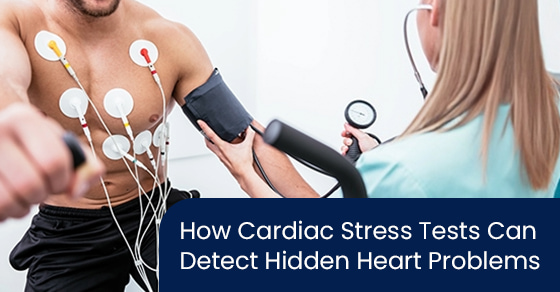How Cardiac Stress Tests Can Detect Hidden Heart Problems

Cardiac stress tests used to be commonplace in some areas for middle-aged men as part of their annual physical. It was an essential component for diagnosing and detecting chest pain by showing how well blood is pumped to the heart. It was additionally essential in older individuals with an increased risk for heart disease.
Today, stress tests assess how efficiently the heart functions during physical activity. Cardiac stress tests provide a reliable method for determining a person’s cardiac health status. When individuals are seated, no strain is placed on the heart. However, during physical daily activity, the workload on the heart increases dramatically.
What is a stress test?
Stress tests for the heart involve a person walking on a treadmill or stationary bike. Sticky electrode patches are put on the chest to record your heartbeat. These electrodes are connected to a computer, which prints or shows your test results. This portion of the test is known as an electrocardiogram (ECG).
A cuff on the arm measures blood pressure, and people are often asked to breathe into a tube to demonstrate their breathing capabilities while exercising.
Exercise begins at a reduced speed and gradually increases, causing the heart to work harder. Different criteria are examined as a person continues to walk. Abnormal results indicate a significant risk of coronary artery disease (CAD).
Exercise is continually monitored until your heart rate is at a target level. Some people may need to stop sooner if they experience the following symptoms:
- Fatigue
- Moderate to severe chest pain
- Dizziness
- Irregular heartbeat
- Unusually high or low blood pressure
- Severe shortness of breath
Your healthcare provider may stop the test if concerns arise, and you can stop the test if you are feeling uncomfortable.
Stress tests are used if there are symptoms of CAD or irregular heartbeats (arrhythmia). They can also help doctors by highlighting the seriousness of your condition, advising on treatment, assessing the heart’s function, or evaluating the effectiveness of current treatment.
How does a cardiac stress test detect hidden heart problems?
Cardiac stress tests are diagnostic tools for those with suspected CAD and to provide the prognosis for those diagnosed with the disease. It determines the heart’s functioning to assess the extent and probability of disease, and to understand the effects and risks of treatment. The testing is done for the following reasons:
- Diagnosing irregular heartbeats: Arrhythmias will cause your heart to beat too fast or too slow.
- Determining the severity of CAD: Coronary arteries are major blood vessels delivering oxygen and blood to the heart. CAD occurs when there is disease or damage to the arteries. For example, cholesterol deposits in the arteries can cause inflammation that leads to CAD.
- Checking the heart before surgery: Stress tests help doctors determine if surgery will pose any risks. It is instrumental in assessing the safety of treatment if you are undergoing a heart transplant or valve replacement.
Why might I need one?
A stress test may be necessary to see if you have heart problems, such as:
- Congestive heart failure
- Heart valve disease
- Congenital heart disease
- Coronary artery disease
- Hypertrophic cardiomyopathy
Those with high-risk jobs (such as professional athletes or pilots) may also need to have stress tests.
Additionally, stress tests may be performed if you exhibit symptoms of angina (chest pain and/or discomfort from poor blood flow to the heart), lightheadedness/dizziness, shortness of breath, or arrhythmias.
They are also conducted if you already have a heart disease diagnosis and want to begin exercising, are undergoing specific treatments, have underlying health conditions or diabetes increasing your risk for heart disease, have higher complication risks from family or personal heart disease history, or need non-cardiac surgery and your complication risks must be assessed.
For those with arrhythmias, you may require an ambulatory ECG (Holter monitor). A Holter monitor is a portable device that shows your heart’s electrical activity for 24 hours (a 24-hour ECG) to a few weeks while you go about your daily routine.
Stress tests are also conducted in those without symptoms or known heart disease to assess their risk. It is done on those with additional risks like high cholesterol, high blood pressure, diabetes, or family histories of premature heart disease.
Why is it essential?
Any medical test can illustrate results that require additional testing or whether further testing is necessary. Additional tests do have complications that can arise. Your cardiologist will use their best judgment to determine whether to advise having routine stress tests. Your family/medical history, age, symptoms, habits (such as smoking), and risk factors are all considered when deciding whether to test or not.
Furthermore, heart disease in women presents differently. Doctors often find it challenging to detect the disease in its early stages in women. Therefore, stress tests can be customized based on gender and age.
What do the results show?
Your results will help your physician adjust or plan your treatment. If your heart is functioning well, you may not need additional testing. However, if the results suggest that you may have CAD, you may be sent for a coronary angiogram, which will show any heart blockages in your arteries.
If the results are satisfactory, but your symptoms worsen, additional testing may be recommended. Your doctor may recommend a stress test, such as an echocardiogram or a nuclear stress test. Both tests will provide more details on how your heart is functioning.
What the Results Mean
Stress tests determine whether one or more coronary arteries supplying the heart have plaque (fatty deposits) that may block a blood vessel by 70% or more. You may need to undergo extra testing to confirm the results.
- Normal: There is no significant CAD (determined by an arterial blockage of 70% or more). However, it is essential to note that even with a normal result, a heart attack is still possible if a minor blockage (under 70%) ruptures, forming a clot.
- Abnormal: There is a blockage of 70% or greater. False results are possible. However, further testing is required to determine whether this is the case. Additional testing will confirm or rule out whether CAD is present.
Aspire Cardiology Provides Comprehensive Services in One Location
Aspire Cardiology offers cardiac stress tests, consultations, electrocardiograms, Holter monitoring, and echocardiograms all in one convenient location. Booking an appointment is essential for your overall heart health, especially for those who regularly smoke, experience chest pain, and/or have a family history of CAD, elevated cholesterol levels, peripheral arterial disease, or additional heart-related symptoms.
Neglecting your heart health can have serious repercussions. Book your appointment now by calling us at 647-503-3639 or emailing us at admin@aspirecardiology.com. You can also contact us online for more information.

